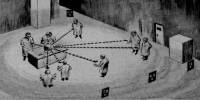Dr. Ivan Maksymov, a co-winner of this year’s IG Nobel Prize in Physics, has shown that lockdowns do not have to stop scientific progress by getting drunken worms in vodka, putting them on speakers and measuring their vibrations with a laser. Along with bizarre listening, the study is a spin-off of truly important brain research. A project in the Annals of Impossible Research at the Nobel Prizes initially mocked the idea that “” cannot be made or recreated “, but has since expanded to cover a science that” makes you laugh first, then makes you think ” Fine and important papers have been honored in this way, as well as a few original descriptions.
Maksymov and collaborator Dr Andrew Pototsky, both from Swinburne University in Australia, are trying to test an estimate of sound waves and electrical impulses that carry information into the brain. Naturally, some preparations need to make before the living brain can begin to vibrate to test the concept, so Maksymov decided to establish the response of a normal organism. “Earthworms were used because they are cheap, do not require ethical approval, and their axes are somewhat similar to those of mammalian nerve fibers. In addition, an insect repellent can be easily made using vodka, “Maksymov said in a statement. He told IFLScience that he could thank his teacher in his native Ukraine, who used vodka water to anesthetize animals for experiments, because it was safer than pure ethanol when students drank it.
As soon as the university closed for the epidemic, Maksymov set up a laboratory in his shed, placed four species of insects on a sub-wafer, and monitored the frequency of their vibrations. Analyzing the results, they submitted their work to a leading physics journal that told them it was “out of the realm of journals,” Maksymov told IFLScience. It published in the prestigious journal Scientific Report. Australia has won an incomplete number of IG Nobels (as opposed to Nobels). Maksymov says his adopted nation is “a land of opportunity and open thought.” In some countries, an elderly colleague said it was a waste of money.” Maksymov told IFLScience that they are making progress in the search for sound waves in the brain, but “we can’t say for sure that we’ve demonstrated these yet.” Since its inception, Maksymov has discovered that his methods could help engineers trying to model robots on earthworms to measure the hardness coefficient of insects.
Other IG Nobel laureates include a material science prize awarded for proving knives made from frozen human molds. Many entomologists fear spiders, but not the insects they study, and a prize was created in anthropology for the discovery. The Economics Prize won a relationship between a country’s income inequality and how many times its public kisses, while helium won prizes experimentally in breathing elastics Researchers were trying to discover how alligators produce their mating bows. The higher frequencies generated when breathing in a mixture of helium and oxygen proves that crocodiles, like humans, use their vocal tracts, an indication that dinosaurs can do the same.
Outside of science, the management prize goes to the five hitmen who tried to assassinate each other, and the world leaders who provoked the most Covid-19 reactions – US President Donald Trump, Boris Johnson of the United Kingdom, Zaire Bolsonaro of Brazil and Vladimir Putin of Russia. They awarded the Medical Education Prize “for using the Cavid-19 viral epidemic to educate the world that politicians can have an immediate impact on life and death more than scientists can and doctors can.”
















